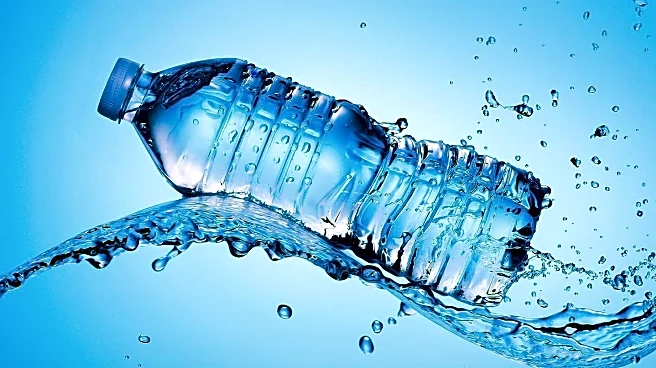What's Happening?
A recent study conducted by researchers at Concordia University has highlighted the significant intake of microplastic particles by individuals who regularly consume water from single-use plastic bottles. The study analyzed over 140 scientific articles and found that the average person ingests between 39,000 and 52,000 microplastic particles annually. However, those who frequently drink from plastic bottles could be consuming an additional 90,000 particles each year. Microplastics, which are less than 5 millimeters long, can leach into the water from the bottle's inner surface, especially when the bottle is squeezed or heated. Sarah Sajedi, an environmental management expert and lead author of the study, emphasized that while drinking from plastic bottles is acceptable in emergencies, it should not be a daily practice due to the chronic toxicity associated with microplastic exposure.
Why It's Important?
The findings of this study are significant as they raise concerns about the long-term health impacts of microplastic consumption. Microplastics can enter the bloodstream and accumulate in vital organs, potentially leading to chronic inflammation, hormone disruption, and other health issues. The study calls for standardized testing to measure microplastic levels in products and stronger policies to limit plastic contamination. With bottled water being America's top packaged drink, the implications for public health are considerable. The International Bottled Water Association has acknowledged these concerns and supports further research, highlighting the need for consumer education on the chronic toxicity of microplastics.
What's Next?
The study's authors are advocating for standardized testing and stronger policies to address microplastic contamination in bottled water. This could lead to regulatory changes in the bottled water industry, aiming to reduce microplastic exposure. The industry may face increased scrutiny and pressure to improve packaging standards. Additionally, there may be a push for alternative packaging solutions and increased public awareness campaigns to educate consumers about the risks associated with microplastic consumption.
Beyond the Headlines
The study underscores the broader environmental and health challenges posed by plastic pollution. As microplastics are pervasive in various products, the issue extends beyond bottled water, affecting food, cosmetics, and clothing. This highlights the need for a comprehensive approach to tackle plastic pollution, including innovations in packaging and waste management. The cultural shift towards sustainability and mindful consumption may gain momentum as awareness of microplastic risks grows.









